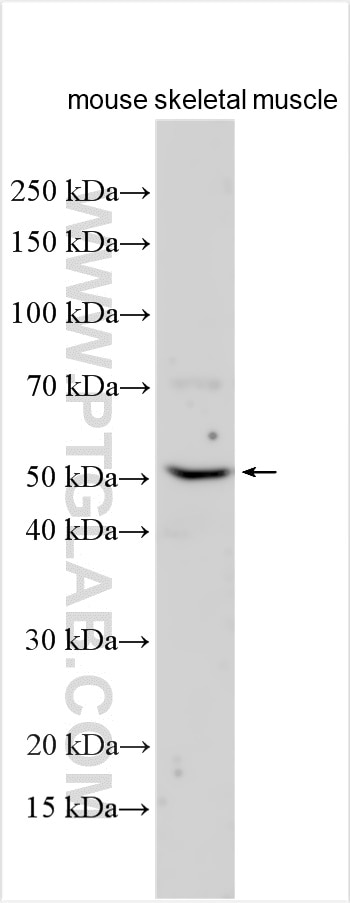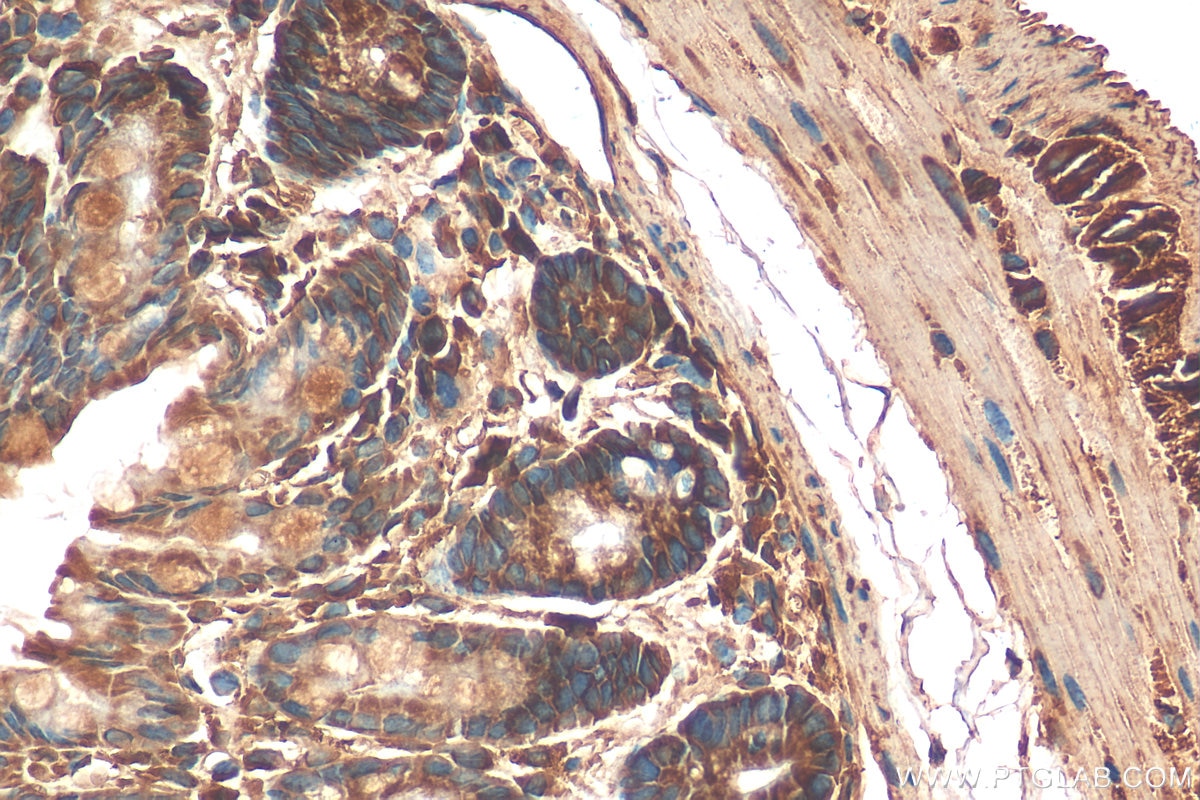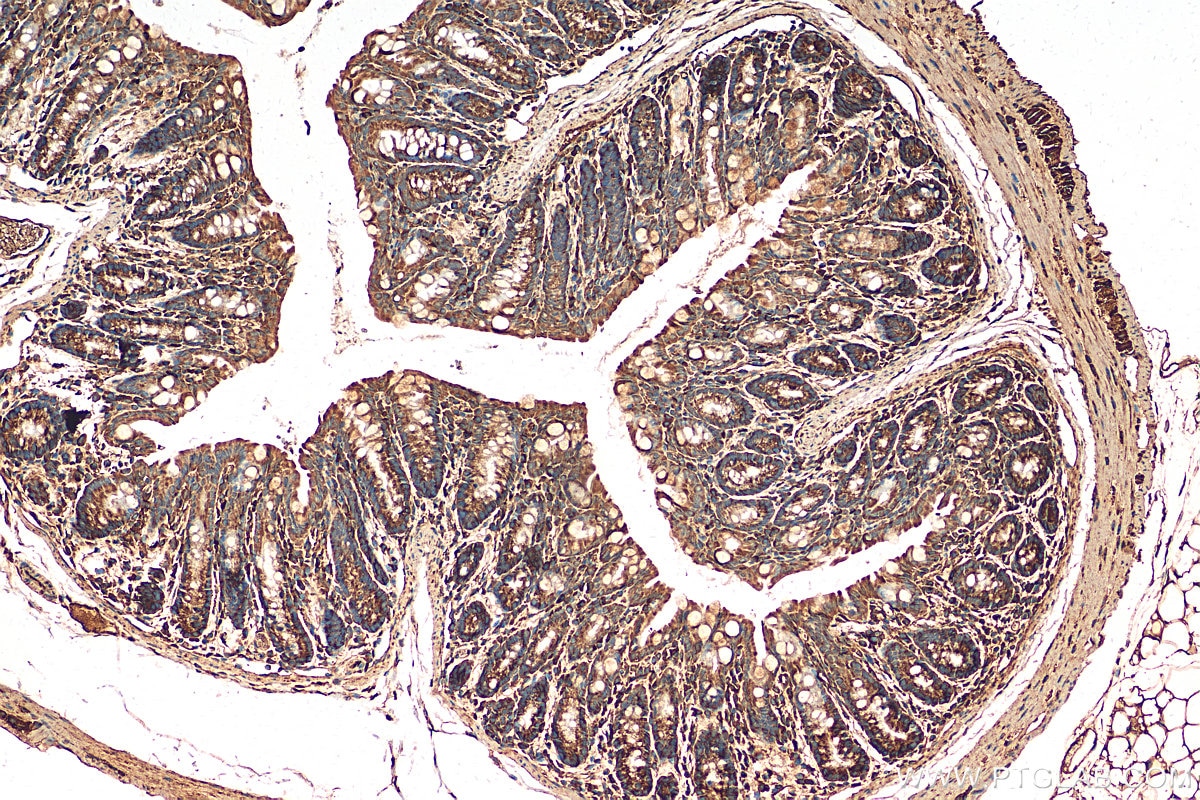Tested Applications
| Positive WB detected in | mouse skeletal muscle tissue |
| Positive IHC detected in | mouse colon tissue Note: suggested antigen retrieval with TE buffer pH 9.0; (*) Alternatively, antigen retrieval may be performed with citrate buffer pH 6.0 |
Recommended dilution
| Application | Dilution |
|---|---|
| Western Blot (WB) | WB : 1:500-1:1000 |
| Immunohistochemistry (IHC) | IHC : 1:50-1:500 |
| It is recommended that this reagent should be titrated in each testing system to obtain optimal results. | |
| Sample-dependent, Check data in validation data gallery. | |
Product Information
21171-1-AP targets AMDHD1 in WB, IHC, ELISA applications and shows reactivity with human, mouse samples.
| Tested Reactivity | human, mouse |
| Host / Isotype | Rabbit / IgG |
| Class | Polyclonal |
| Type | Antibody |
| Immunogen |
CatNo: Ag15420 Product name: Recombinant human AMDHD1 protein Source: e coli.-derived, T-HIS Tag: 6*His Domain: 78-426 aa of BC029146 Sequence: CILPGLVDAHTHPVWAGERVHEFAMKLAGATYMEIHQAGGGIHFTVERTRQATEEELFRSLQQRLQCMMRAGTTLVECKSGYGLDLETELKMLRVIERARRELDIGISATYCGAHSVPKGKTATEAADDIINNHLPKLKELGRNGEIHVDNIDVFCEKGVFDLDSTRRILQRGKDIGLQINFHGDELHPMKAAELGAELGAQAISHLEEVSDEGIVAMATARCSAILLPTTAYMLRLKQPRARKMLDEGVIVALGSDFNPNAYCFSMPMVMHLACVNMRMSMPEALAAATINAAYALGKSHTHGSLEVGKQGDLIIINSSRWEHLIYQFGGHHELIEYVIAKGKLIYKT Predict reactive species |
| Full Name | amidohydrolase domain containing 1 |
| Calculated Molecular Weight | 426 aa, 47 kDa |
| Observed Molecular Weight | 50 kDa |
| GenBank Accession Number | BC029146 |
| Gene Symbol | AMDHD1 |
| Gene ID (NCBI) | 144193 |
| RRID | AB_3085642 |
| Conjugate | Unconjugated |
| Form | Liquid |
| Purification Method | Antigen affinity purification |
| UNIPROT ID | Q96NU7 |
| Storage Buffer | PBS with 0.02% sodium azide and 50% glycerol, pH 7.3. |
| Storage Conditions | Store at -20°C. Stable for one year after shipment. Aliquoting is unnecessary for -20oC storage. 20ul sizes contain 0.1% BSA. |
Background Information
AMDHD1 is a protein-coding gene that encodes the enzyme imidazolonepropionase. It is involved in the histidine catabolic process and has one potential isoform. The protein of AMDHD1 is located in the cytoplasm, and is expressed in all tissues, mainly in the liver, kidney and adrenal gland.
Protocols
| Product Specific Protocols | |
|---|---|
| IHC protocol for AMDHD1 antibody 21171-1-AP | Download protocol |
| WB protocol for AMDHD1 antibody 21171-1-AP | Download protocol |
| Standard Protocols | |
|---|---|
| Click here to view our Standard Protocols |








